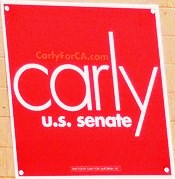Carly Fiorina facts for kids
Quick facts for kids
Carly Fiorina
|
|
|---|---|
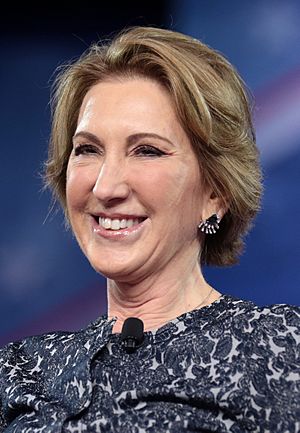
Fiorina in February 2017
|
|
| Born |
Cara Carleton Sneed
September 6, 1954 Austin, Texas, U.S.
|
| Education | Stanford University (BA) University of California, Los Angeles University of Maryland, College Park (MBA) Massachusetts Institute of Technology (MS) |
| Occupation |
|
| Organization | Good360 |
| Political party | Republican |
| Board member of | Colonial Williamsburg Foundation |
| Spouse(s) |
Frank Fiorina
(m. 1985) |
| Children | 2 stepdaughters |
| Relatives | Joseph Sneed (father) |
| Signature | |
 |
|
Cara Carleton "Carly" Fiorina (born September 6, 1954) is an American businesswoman and politician. She is best known for being the chief executive officer (CEO) of Hewlett-Packard (HP) from 1999 to 2005. Carly Fiorina was the first woman to lead a Fortune Top-20 company.
She began her career at AT&T and later worked at Lucent Technologies. There, she led an important partnership with Philips. In 2002, Fiorina managed a huge merger. HP bought Compaq, another computer company. This made HP the world's biggest seller of personal computers.
Carly Fiorina later became an advisor for Republican Senator John McCain's 2008 presidential campaign. In 2010, she ran for the United States Senate in California. She won the Republican nomination but lost the main election. In 2016, she was a candidate for the Republican presidential nomination. For a short time, she was also the running mate for Ted Cruz. In 2020, Fiorina supported Joe Biden for president.
Contents
Early Life and Education
Carly Fiorina was born Cara Carleton Sneed on September 6, 1954. Her birthplace was Austin, Texas. Her father, Joseph Tyree Sneed III, was a law professor and later a judge. Her mother was an abstract painter. The name "Carleton" has been in her family for many generations.
Because her family moved often, Carly attended five different high schools. One of these was in Ghana. She graduated from Charles E. Jordan High School in North Carolina. She once dreamed of becoming a classical pianist.
In 1976, she earned a Bachelor of Arts degree from Stanford University. She studied philosophy and medieval history. After college, she briefly attended law school. She then worked as a real estate broker. In 1977, she moved to Italy with her first husband. There, she taught English to Italian businesspeople.
Carly Fiorina later earned two master's degrees. In 1980, she received a Master of Business Administration (MBA) from the University of Maryland, College Park. In 1989, she earned a Master of Science degree from the MIT Sloan School of Management.
Business Career Highlights
Working at AT&T and Lucent
In 1980, Fiorina joined AT&T as a management trainee. She sold telephone services to large government agencies. By 1990, she became the company's first female officer. She oversaw the hardware and systems division.
In 1995, Fiorina helped create Lucent Technologies. This was a new company formed from parts of AT&T. She played a key role in its successful launch in 1996. Lucent's initial public offering (IPO) raised US$3 billion. This was one of the most successful IPOs in U.S. history.
Later, Fiorina became president of Lucent's consumer products. In 1997, she led a large global business section. She also chaired a US$2.5 billion partnership. This was between Lucent and Royal Philips Electronics. In 1998, Fortune magazine called her "The Most Powerful Woman in American Business." During her time, Lucent added 22,000 jobs. Its revenues grew from US$19 billion to US$38 billion.
Leading Hewlett-Packard (HP)
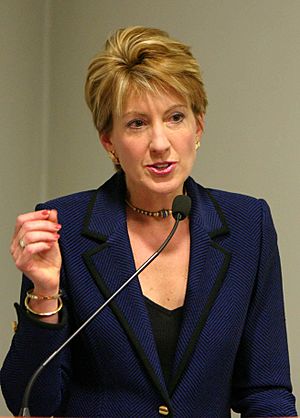
In July 1999, Carly Fiorina became the chief executive officer of Hewlett-Packard Company. She was the first woman to lead a Fortune Top-20 company. Her hiring was seen as a big step for women in business. She received a large signing bonus and salary.
One of her first big tasks was separating HP's analytical instruments division. This new company became Agilent Technologies. She also suggested buying a part of PricewaterhouseCoopers. This deal did not happen.
The Compaq Merger
In September 2001, Fiorina announced that HP would buy Compaq. This was a US$25 billion deal. At the time, Compaq was the second-largest maker of personal computers. The merger made HP the world's biggest personal computer manufacturer.
Fiorina faced strong opposition to the merger. Walter Hewlett, the son of HP's co-founder, fought against it. Fiorina won the support of shareholders by a very small margin. She then reorganized HP and merged it with Compaq.
Many people were unsure about the merger at first. However, it was later seen as successful. HP managed to combine Compaq's operations. This helped HP become a leader in the PC market.
Changes at HP
Fiorina made several big changes at HP. She replaced profit sharing with bonuses based on company goals. She also reduced the number of operating units. These changes were meant to help HP grow.
Some employees and tech experts were unhappy. They felt she changed HP's traditional "HP Way" work culture. This culture was known for being very fair and consensus-driven. Employee satisfaction surveys showed "widespread unhappiness."
However, some people argue that Fiorina prepared HP for the Internet Age. They believe her changes helped the company compete better.
iPod+HP Partnership
In 2004, Fiorina made a deal with Apple founder Steve Jobs. HP would sell a special iPod called "iPod+HP." As part of the deal, HP could not sell a competing music player. HP also had to install iTunes on all its computers.
This partnership did not work out well for HP. Apple continued to sell its own iPods. HP was left selling older iPod models. Soon after Fiorina left HP, the new CEO ended the agreement.
Job Changes at HP
During her time, Fiorina oversaw job changes at HP. In 2001, HP laid off 1,700 marketing employees. She also asked employees to take pay cuts or use vacation time to save money. Despite these efforts, 6,000 jobs were cut. After the Compaq merger, another 15,000 jobs were planned to be cut.
In total, about 30,000 U.S. employees were laid off due to the merger. However, the total number of HP employees increased during her leadership. This was because of the Compaq merger and other company acquisitions. When Fiorina became CEO in 1999, HP had 84,800 employees. By the time she resigned in 2005, HP had about 150,000 employees worldwide.
Why She Left HP
HP's revenue doubled under Fiorina. The company's cash flow also increased. However, HP's stock price fell by 50%. This was a bigger drop than other similar companies.
In early 2005, HP's board of directors discussed company performance with Fiorina. They suggested changes to her authority. Fiorina disagreed with these plans. Less than a month later, she was asked to resign as CEO and chair. HP's stock price jumped after the news. This added almost three billion dollars to the company's value.
Fiorina received a severance package of US$21 million. She later wrote in her book Tough Choices that the board's behavior was "amateurish and immature."
Business Leadership Reputation
From 2003 to 2005, Fortune Magazine named Fiorina the most powerful woman in business. In 2004, Time magazine included her in its "most influential people" list. The Wall Street Journal described her as a new kind of CEO. She had big visions but was also seen as demanding.
After she left HP, some people ranked her as one of the worst tech CEOs. They criticized her management style. Others defended her decisions. They believed the Compaq merger was successful in the long run.
Other Work and Public Life
Her Autobiography
In October 2006, Carly Fiorina published her autobiography. It was called Tough Choices. The book covered her career and her thoughts on leadership. It also discussed how women can succeed in business.
Nonprofit Work
Good360
In April 2012, Fiorina became chair of Good360. This is a nonprofit organization that helps companies donate extra products to charities. Good360 is known for being very efficient. It is one of the largest product donation marketplaces in the world. Fiorina left Good360 when she announced her presidential campaign in 2015.
One Woman Initiative
Fiorina also served as Fund Chair of the One Woman Initiative (OWI). This group works to empower women in Muslim-majority countries. It focuses on helping women with business, leadership, and legal rights.
Opportunity International
In 2013, Fiorina partnered with Opportunity International. This organization provides financial help and training to women living in poverty. She became their Global Ambassador. She resigned from their board when she ran for president.
Fiorina Foundation
Carly Fiorina is also the chair and CEO of the Fiorina Foundation. This charity supports causes like helping sick children and education in Africa. The foundation uses her personal wealth for donations.
Colonial Williamsburg Foundation
In 2017, Fiorina joined the board of trustees for the Colonial Williamsburg Foundation. In December 2020, she was chosen as the chair of the board.
Political Career
Carly Fiorina has never held public office. She often says that being an "outsider" is a good thing. She believes professional politicians have not done enough for Americans.
Working with John McCain in 2008
In 2006, Fiorina advised Republican Senator John McCain for his 2008 presidential campaign. In March 2008, she became the fundraising chair for the Republican National Committee. She was a key person for McCain on business and economic issues.
She defended McCain's choice of Sarah Palin as his running mate. Fiorina said Palin was facing unfair attacks. However, in an interview, Fiorina said she did not think Palin or McCain could run a major company. After these comments, she was less visible in the campaign.
Running for U.S. Senate in 2010
On November 4, 2009, Fiorina announced she would run for the United States Senate in California. She wanted to unseat the current Senator, Barbara Boxer. Her campaign received support from Sarah Palin.
One of her campaign ads, featuring a "Demon Sheep", got a lot of attention. It was largely seen as negative. On June 8, 2010, Fiorina won the Republican primary election.
Public records showed Fiorina had not voted in many past elections. She admitted this, saying, "Shame on me." On social issues, she held conservative views. She supported Proposition 8, which banned same-sex marriage in California. She also believed that global warming was a serious issue but that the science was still being studied.
Fiorina opposed certain environmental laws. She thought they would cost jobs. She also opposed raising the gas tax. She believed it would hurt families and the economy.
In the general election, Barbara Boxer defeated Fiorina.
Presidential Campaign in 2016
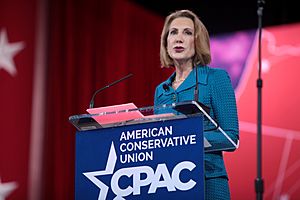
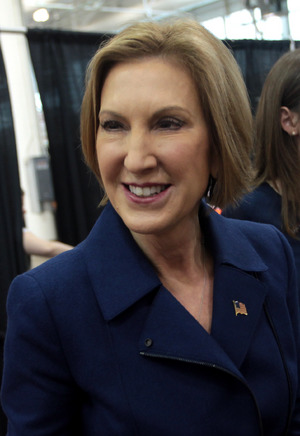
In November 2014, reports said Fiorina was thinking about running for president in 2016. Her business background and being the only woman candidate were seen as strengths. However, her past election loss and leaving HP were challenges. In March 2015, she said there was a "higher than 90% chance" she would run.
She officially announced her presidential campaign on May 4, 2015. Her performances in early debates helped her. She gained support after challenging Donald Trump in a debate. However, her poll numbers later dropped.
On February 10, 2016, Fiorina ended her campaign. This was due to low results in early primary elections. On March 9, 2016, she supported Ted Cruz for president. She said she was "horrified" by Donald Trump.
Vice Presidential Run and Aftermath
On April 27, 2016, Ted Cruz announced Fiorina as his vice presidential running mate. This would happen if he became the Republican nominee. However, Cruz suspended his campaign six days later. This made Fiorina's vice-presidential candidacy the shortest in modern American history.
After Trump's election, Fiorina was considered for a government position. In 2020, she endorsed Joe Biden for president. She stated her disapproval of President Donald Trump.
Political Views
When Carly Fiorina first entered politics in 2009, she was seen as a moderate Republican. Her views changed during her campaigns. In 2017, she described herself as conservative. In 2020, she announced she would vote for Joe Biden.
Social Issues
Fiorina has criticized the Common Core State Standards for education. She believes they are big, failing government programs. This was a change from her earlier support for similar education policies.
She supported the DREAM Act in California. This act would help children brought to the U.S. by their parents gain residency.
Fiorina opposed same-sex marriage but supported civil unions. She later said she hoped the nation would support the decision legalizing same-sex marriage. She also said she respected individual beliefs. She does not support a constitutional amendment to ban gay marriage. In 2017, she spoke at an event for Log Cabin Republicans, a group supporting LGBT rights. She said, "Everyone has to be free to be who they are."
Fiorina believes employers should decide on paid maternity leave. She does not think the government should require it. She noted that HP offered paid maternity leave when she was CEO.
Foreign Policy
Fiorina has criticized the nuclear agreement with Iran. She called it a "flawed deal." She believes Iran is a source of evil in the Middle East. She also thinks the agreement's checks are not strong enough.
She opposes making U.S. relations with Cuba normal. She said she would close the U.S. embassy in Havana if elected. Fiorina also supports keeping the Guantanamo Bay detention camp open. In 2015, she defended waterboarding, a tactic used during the War on Terror.
Economic Issues
Fiorina has criticized the Affordable Care Act (ACA). She called it "deeply flawed." She supports repealing the ACA. She believes individuals should have high-deductible insurance plans.
She believes the federal government should not set minimum wages. She thinks states should decide this. She also believes raising the federal minimum wage would hurt people looking for entry-level jobs.
Fiorina opposes net neutrality rules. She believes government regulation hurts innovation. She has said she would "roll back" these policies.
She generally believes that fewer government regulations help the economy. She has criticized the Dodd–Frank Wall Street Reform and Consumer Protection Act. She wants to lower tax rates and simplify the tax code. She also wants to close loopholes that benefit wealthy taxpayers. Fiorina opposes increasing federal or state gas taxes. She believes it would harm families and economic growth.
She also opposed the 2009 federal stimulus package. She called it a waste of taxpayer money. Fiorina suggests cutting federal workers' pay. She also supports zero-based budgeting for the federal budget. This means each department would start budgeting from zero each year.
Fiorina supports expanding the H-1B visa program. She believes America must compete globally for jobs.
Personal Life
Carly Fiorina married Todd Bartlem in 1977. They divorced in 1984. In 1985, she married Frank Fiorina. It was the second marriage for both of them. Carly helped her husband raise his two daughters from his first marriage.
In February 2009, Fiorina was diagnosed with breast cancer. She had surgery and treatment. She was given a good chance for a full recovery. She even joked about it during her Senate campaign.
In 2015, Fiorina and her husband had a combined net worth of US$59 million. They live in Virginia, near Washington, D.C. They also owned a home in California. Fiorina has said she is Christian and was raised Episcopalian.
See also
 In Spanish: Carly Fiorina para niños
In Spanish: Carly Fiorina para niños
 | George Robert Carruthers |
 | Patricia Bath |
 | Jan Ernst Matzeliger |
 | Alexander Miles |


